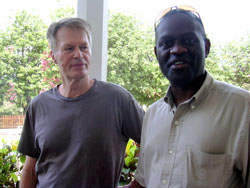Elegant and reserved, Jean-Marie Le Clézio is not used to the flashes. His Nobel Prize acceptance speech, on December 7th last, in the great hall of the Swedish Academy, allowed this talented writer to share his most intimate reflections. Before an audience of cultural dignitaries, he posed the simple question of a man and of all humanity: Why do we write? “I imagine that everyone has their answer to this simple question. There are predispositions, environment, circumstances. Inabilities too. If one writes, it means that one does not act. That one feels challenged by reality, that one chooses another means of reaction, another way of communicating, a distance, a time for reflection.”
The Origins
But for Le Clézio, his writings find their origins in one of the darkest parts of human history, the Second World War. Born in Nice, on April 13, 1940, he did not know the battles, but his mind remains marked forever.
“If I examine the circumstances that led me to write — I do not do it out of complacency, but out of concern for accuracy — I can see that at the beginning of it all, for me, there is the war […] Not for a moment did it seem to me a historical moment. We were hungry, we were scared, we were cold, that’s all.” […] “In the years following the war, I remember lacking everything, and particularly something to write and read. For lack of paper and ink pen, I drew and wrote my first words on the back of rationing booklets, using a blue and red carpenter’s pencil. From that, I retained a certain taste for rough surfaces and ordinary pencils. For lack of children’s books, I read my grandmother’s dictionaries. They were wonderful gateways to set out to discover the world, to wander and dream in front of the plates of illustrations, maps, and lists of unknown words. The first book I wrote, at the age of six or seven, was titled ‘The Globe to Sail’.”
Recognition
But the general public only discovered and acclaimed this child of the country upon the publication of his first work, “The Interrogation.” In the 1970s, his writings bore the mark of the “new novel,” a movement that preceded the famous cinematic “New Wave” and which, like it, rejected the classicism of its peers.
Then, influenced by his origins (a Breton family who emigrated to Mauritius and acquired British nationality) and passionate about Amerindian cultures, he published “Desert” (1980) and “The Prospector” (1985). In the 2000s, he wrote about himself and his family, as in “The African” (2004) which pays tribute to his father, a surgeon in Africa. Le Clézio, who considers himself as coming from a Mauritian culture and French language, is now awarded the Nobel Prize for Literature.



